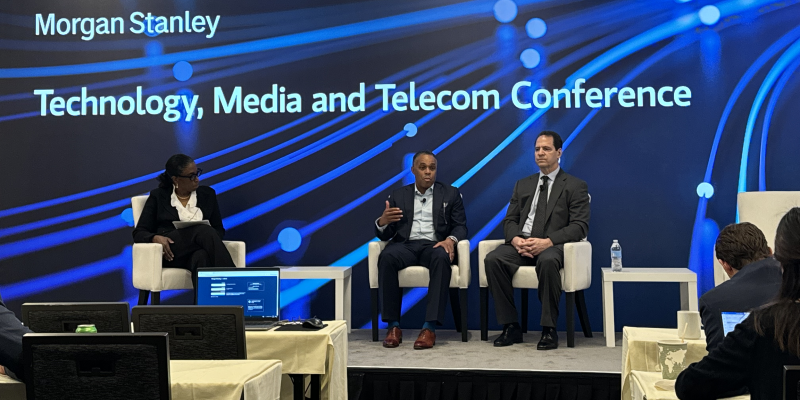In a fireside chat, Steve Beard and Bob Phelan shared how Adtalem addresses healthcare workforce shortages by investing in partnerships and technology that expand access to education.
On March 6, Adtalem Global Education President and CEO Steve Beard and Chief Financial Officer Bob Phelan participated in a fireside chat at the Morgan Stanley Technology, Media and Telecom Conference.
Melissa James, vice chairman of Morgan Stanley Global Capital Markets, led the discussion about how Adtalem works to solve critical healthcare workforce shortages by investing in innovations that expand access to high-quality higher education for nontraditional students.
Here are a few key perspectives shared by Steve Beard during the conversation.
Healthcare Workforce Shortages
The chronic workforce shortages in healthcare that exist today are only going to grow and grow more severely. There’s a huge demographic cliff in both nursing and medicine as a generation of physicians and nurses get ready to retire.
More than 1 million registered nurses will retire from the workforce by 2030.
The shortages that we’re experiencing in veterinary medicine, we expect to continue to grow. And given what I think everyone agrees is the real mental health crisis in the United States, the need for trained clinical social workers, trained clinical counselors, is only expected to grow.
Walden is among the top 5 grantors of Master of Social Work degrees, and its MS in Clinical Mental Health Counseling is one of the largest programs of its kind in the U.S.
So, we think our exposure to these professions is a real source of competitive advantage for us, because we think the demand for these professions is only going to grow. … We are the largest healthcare educator in the U.S., and we are providing an overlooked community of learners access to rewarding professions.
Adtalem’s Nontraditional Learners
These are very often-times first generation college students, working adults with families, veterans. Rather than asking them to … fit themselves within a rigid model of what higher ed ought to be, we tend to try to meet them where they are and give them the opportunity to have access to these very attractive professions and careers in ways that traditional higher ed to date isn’t really interested in doing.
Student Success
[Something] we focus a lot on is persistence, because even though new enrollments, and new starts, is something lots of folks pay a lot of attention to in our space, we actually think the total enrollment number, which is a combination of new starts and persistence, is a much better way to think about the overall health of the business.
The Impact of Innovation
The other thing to know about online education, relative to classroom-based instruction, is that when you’re engaging students online, you get a tremendous amount of data about how they are engaging with the material, what’s required for them to master certain concepts, how to advise and intervene in ways that drive up student success and improve persistence. It really allows our faculty and our student support people to be quicker in addressing the needs of our students.
Critical Component of U.S. Healthcare
If you look at many of the surveys that are done of hospital and health system CEOs, what you’ll see consistently is that the No. 1 issue they’re concerned about is workforce, either workforce supply or workforce burnout. It is an extremely challenging issue for providers across the U.S.
As we think about the future of our business, one of the things we aspire to is greater proximity to those providers. How can we partner with them in more scaled, more impactful ways to really address those chronic workforce shortages?
We’re having discussions with providers about any number of solutions we might develop together, everything from white labeling nursing schools to creating proprietary pipelines of talent into their systems, starting with training their existing population of employees and creating a sticky relationship between those employees and the systems they work for.
If we can do that in a meaningful way for large providers, I think that elevates the value proposition of Adtalem in a way that has a whole host of benefits.
For more information, email the Adtalem Global Communications Team: adtalemmedia@adtalem.com.



